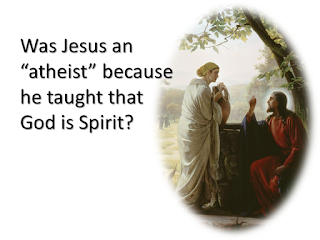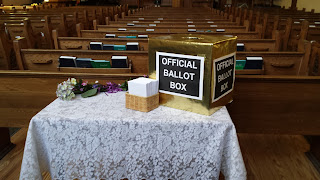Hespeler, 15 May, 2016 © Scott McAndless – Pentecost
John 4:7-24, Galatians 5:16-26, Acts 2:17-21
| I |
f you were to ask me the question, “Do you believe in God? I would answer that question without a moment of hesitation: “Do I believe in God? Yes, of course I believe in God.” In fact, that is kind of the obvious answer for someone in my position to give. It is an answer so obvious that, in general, nobody would even bother to ask the question.
In fact, being a Christian is one of the things that offers me continual assurance that, yes, there is a God because, you know, sometimes I look around at the world and I see everything that goes wrong and it does make me wonder. When I do start to wonder like that, the thing that often reassures me that there is a God who exists and cares is what I have heard and learned from Jesus.
That is why I was surprised to learn recently that one of the really big problems that ancient pagans had with Christians back in the bad old days of the Roman Empire was that they considered us to be atheists.
I mean, you could say a lot of bad things about Christians. We have our flaws and shortcomings and failures. But not believing in God? I wouldn’t call that one of them.
So I’ve thought about that accusation over the last little while. I’ve thought about it a lot. Why would pagan Romans accuse Christians of being atheists? And I get, of course, that the pagans were a bit upset that the Christians wouldn’t acknowledge the existence of their gods. But this was about more than just a question of Christians refusing to recognize Jupiter or Mars or Mercury. To tell the truth, the traditional Roman religions had been on the decline for years before the Christians ever showed up on the scene.
No, this wasn’t just about protecting the status or worship of any particular gods. This was about the Christians challenging the very concept of divinity that the Greco-Roman world had. The problem was that the Christians were a-theists. The problem was that they did not believe in theos, which was the Greek word for the concept of divinity.
And, you know what, in that sense, I think that the critics of Christianity may have been right. Starting with the very words of Jesus and continuing through the life of the early church, the Christians had ways of talking about and interacting with God that totally blew that Greek concept away. If you listened – I mean really listened – to Jesus and his disciples you simply would not have been able to conceive of God in the same way again.
Think, for example, of the way that Jesus speaks of God in our reading this morning from the Gospel of John. Jesus is engaged in a conversation with a Samaritan woman about matters of religion. Jesus has just said something to her that has made her realize that she is not just talking to an ordinary person – that he can somehow speak for God. And her immediate response is to ask him a religious question: “Our ancestors worshiped on this mountain, but [Jews like] you say that the place where people must worship is in Jerusalem.”
The question she is asking is a theistic question. It is the kind of question that Romans might ask about their gods. Where is the best place to worship Jupiter, they might ask. The name of the god might be different but the concern is exactly the same. There are all kinds of assumptions behind a question like that. She is assuming that God requires a certain sort of worship from us. She is assuming that place matters when it comes to such worship. Even more important, she is assuming that worship, properly done in proper places, will influence God to act in certain ways.
And everyone in that world at that time would have expected Jesus to jump into that argument and explain to the woman exactly why it was right and good to worship God only in a particular place – in the temple in Jerusalem. Because if anybody in that world knew anything about gods (and this includes both Jews and Gentiles) they knew that it was vastly important that you access those gods in the right ways and in the right places.
But, while Jesus does acknowledge that, historically speaking, Jerusalem is the place for accessing God, he also says that that is no longer true now. In fact, he announces a brand new insight into the nature of God: “God is spirit,” he says, “and those who worship him must worship in spirit and truth.” And there, right there, you have one good explanation for why people accused Jesus’ followers of being atheists.
You see, the whole development of religion is one of the ways in humans have always dealt with the basic fears that come with life in this very unpredictable world. I mean, who can stand going through this world and just not knowing what terrible thing might happen next? Sickness and disease, war and pestilence, accidents and all kinds of other terrible things that can go wrong seem to shadow our every moment of existence as human beings on this planet. And, most terrifying of all, so much of it seems to happen for no apparent reason.
And so people looked to their gods to explain these things and especially to find a way to control all of the terrible and frightening things that seem to happen in this world. Religion developed as a way to control the things that happen to us by controlling the gods who make these things happen. Holy sites were chosen, temples were built and priests are consecrated to manage all of the ways that the gods were manipulated with rituals and sacrifices to influence them and make things happen in certain ways. I think that this is true of any religion including Judaism and even Christianity in many of its forms.
But when Jesus declared that it didn’t really matter where you worship God – whether in Jerusalem or Samaria – because God was spirit, he was really declaring but he didn’t believe in that kind of God – the kind of God who could be manipulated with our religion.
And, it must be said, that this was a very dangerous thing for him to say because what was at stake was not only the question of where one might worship God. Religion, in all of its forms, has built up these complex power structures over the centuries. If the priests and religious leaders are able to manipulate the gods and so control the terrible things that may happen in this world, then they are extraordinarily powerful and they can use that power as leverage in other areas of life. That’s how religion becomes a powerful tool for manipulating whole populations and for amassing great wealth, which is what it has been for much of human history.
But Jesus, with one short phrase, “God is Spirit,”throws all of that carefully developed power structure to the wind. And I almost mean that literally. There was just one word – both in the Aramaic language that Jesus spoke and in the Greek language of the gospel – one word that was used to speak of both spirit and wind. Pneuma, in Greek, is a word that mean both spirit and wind. Ruach, in Hebrew also means both spirit and wind. So when Jesus calls God spirit he is also calling God wind and, as Jesus says elsewhere in this same gospel, “The wind blows where it chooses, and you hear the sound of it, but you do not know where it comes from or where it goes. So it is with everyone who is born of the Spirit.”
Jesus was saying that, if God is spirit, then God is about as easy to nail down and control as the wind. And I realize that we, as modern people do have a better understanding of where the wind comes from and where it goes, than did the people of Jesus’ time. We know about atmospheric pressures and air currents and how they can influence and change the flows of the wind. But all our knowledge has not brought us to the place where we can make it blow when, where and as hard as we want it to. If we could do that, we would have shut down the fire in Fort McMurray so easily, but we can’t. If the goal of our relgion is to bring God under our control and get him to behave and make life play out as we want, we will be sorely disappointed.
Religion has always had one other goal other than the controlling of the gods. It has also been very useful (especially for those who are most powerful in society) as a way to control populations. Religion has been used to make people to behave in certain ways, to make sure that they don’t ask for too much in the way of change or reform. The fear of the gods and the promise of the religious power structure to control the divine powers in this world has been used to impose laws and standards of behaviour on people and to teach them that they must tolerate the present structures of the world rather than to ask for change.
This power too is destroyed by that one simple phrase, “God is spirit.” We see that in our reading from the letter of Paul to the church in Galatia where Paul writes, “if you are led by the Spirit, you are not subject to the law.” If God is spirit then God is not outside of you telling you through laws and words and scriptures how you ought to behave, God is within you prompting your behaviour in quite unpredictable ways.
Now it must be said that the Christian church has had a troubled history with that declaration of the absolute freedom of believers that is proclaimed in passages like this one. The church has sought to govern over the actions and even the thoughts of its people through laws and rules and power structures, but the original declaraton of your freedom remains there in the scriptures and so, I pray, it will never be forgotten by God’s people.
So, with just three words, “God is spirit,” Jesus really does do a lot to destroy the traditional ways in which people have imagined God and how they have tended to work out their relationshiop with God. It is, I believe, one reason why, in those early centuries, people saw how the Christians lived and declared that they were dangerous atheists – people who did not believe in God in the ways you were supposed to believe in God.
Now, it is it is important to note that Jesus, in saying such things, is not throwing us into the chaos of a Godless world where anything could go wrong at any moment and nothing has any meaning. Jesus does still believe in God, and the God that he does believe in is clearly a God who is extraordinarily gracious and kind and caring. It is a God who he speaks of, above all, as Abba – a word that we will examine in more detail in several weeks. So clearly, it is not Jesus’ intention to leave us with the impression that we are stuck going through life in a dangerous universe where anything can go wrong and nothing ever makes any sense. There is a God and we can trust that God is gracious. It is just that we cannot expect to control that God through our religious practices. We do those things for different reasons.
In the same way, Paul insists, our freedom from the obligation to follow the law does not make us immoral and dangerous people who will inevitably degenerate into the worse excesses of behaviour. He insists that God, as spirit within us, prompts us to the highest of impulses, “the fruit of the Spirit is love, joy, peace, patience, kindness, goodness, faithfulness, gentleness, and self-control.”
So do not be afraid of those three words, “God is spirit,” and where they will lead us. But they definitely disturb the ways in which the world has learned to think about God. I think it was one of the things that led to that anti-Christian accusation of atheist. Though Jesus seems to have been clear on this matter, it seems that the church has long struggled with such a view of God. It seems to be easier to fall into the old ways of thinking about and relating to God. All it seems to cost us is our freedom – our freedom from law and from fear.
Wouldn’t it be awesome if we could just get so hung up on the radical ways in which Jesus spoke about God that it would transform us? Wouldn’t it be amazing if the outside world looked at us and said, “I’ve never seen a people who believed in a God like that! Doesn’t remind me of any God I’ve ever heard of.” And then, maybe, they would ask to learn more about the God that we worship.
#TodaysTweetableTruth #Jesus said God=Spirit, presenting view of God so new it seemed atheistic. What if we had such a radical view of God?













